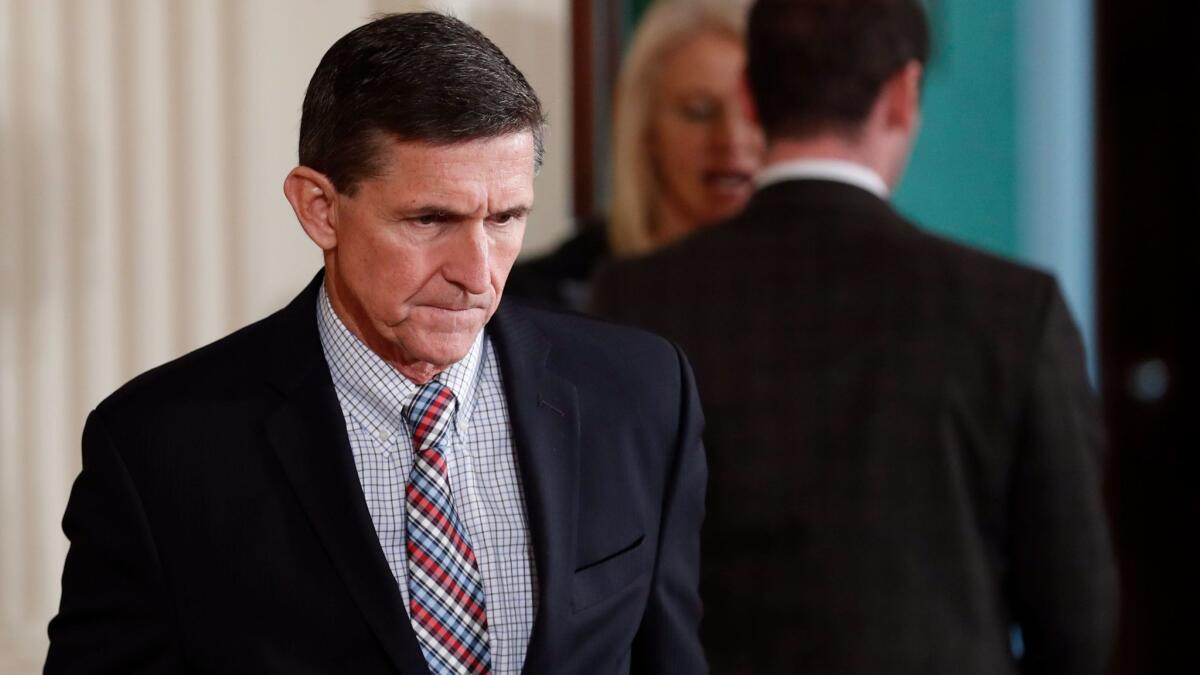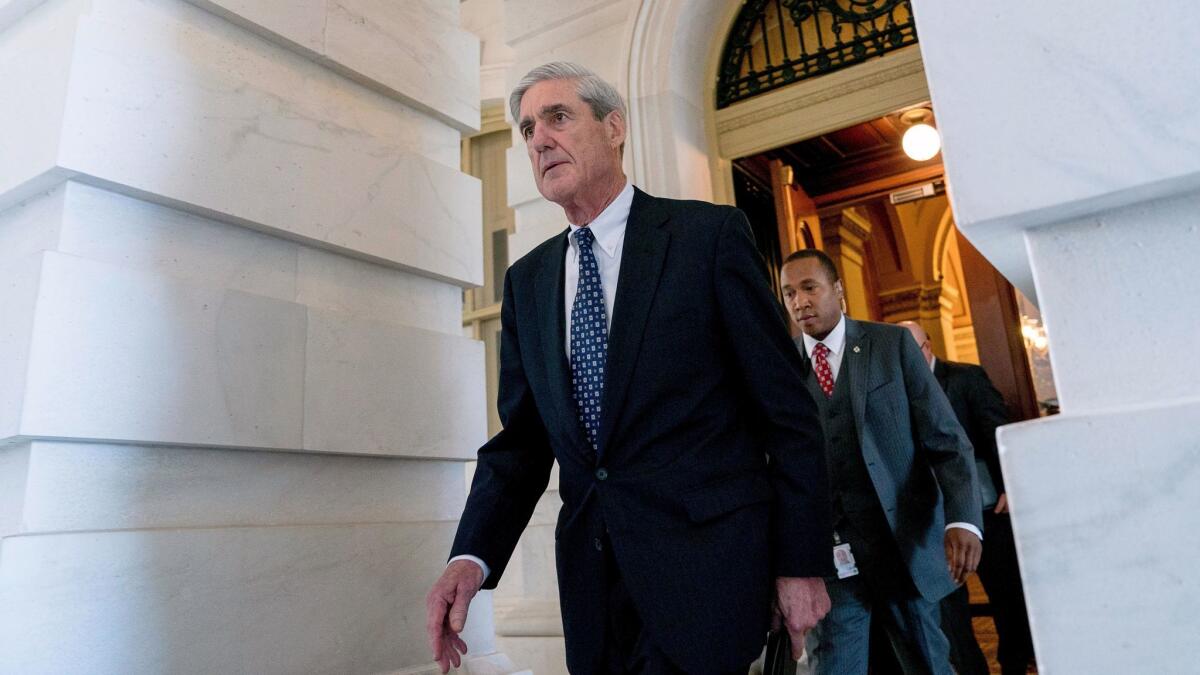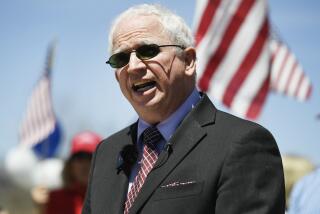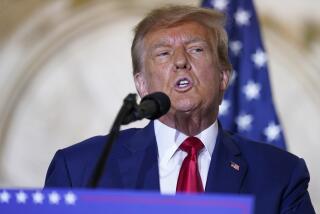Ousted over Russian contacts, ex-national security advisor faces new scrutiny for ties to Turkey

In the lucrative world of Washington consulting, businesses often burnish their reputations by adding bold-faced names to their boards.
So after Michael Flynn was fired as head of the Defense Intelligence Agency in 2014 for what the Obama administration said was mismanagement, he asked former CIA Director R. James Woolsey Jr. to serve as an advisor for his new company, the Flynn Intel Group.
The position involved little work, according to a source with knowledge of the relationship, until a fateful encounter at the JW Marriott Essex House, a luxury hotel in midtown Manhattan, on Sept. 19, 2016, about seven weeks before the presidential election.
The meeting — which involved Flynn, Woolsey and Turkey’s minister of foreign affairs, Mevlut Cavusoglu — is among those special counsel Robert S. Mueller III is investigating as he seeks to determine whether President Trump’s current or former aides helped Russian meddling in the presidential election or engaged in other misconduct.
The Essex House group discussed forcibly removing Fethullah Gulen, a dissident Turkish cleric who lives in exile in Pennsylvania, and sending him back to Turkey, according to Woolsey. He later described the idea to the Wall Street Journal as “a covert step in the dead of night to whisk this guy away.”
Flynn was a senior advisor to Trump’s presidential campaign at the time. His company also was being paid $530,000 to dig up and disseminate incriminating information about Gulen, payments Flynn didn’t disclose until four months after the election.
Shortly after Trump won the election, he named Flynn as his national security advisor, a position of immense power in the White House. The retired Army three-star general had led a distinguished career in military intelligence in Iraq and Afghanistan, but most Americans knew him only for his angry denunciation of Hillary Clinton at the Republican National Convention, where he led the crowd in chants of “Lock her up!”

But in December 2016, during the transition, Flynn reportedly had a second meeting with Turkish government officials at the 21 Club, an upscale New York restaurant. They again discussed a Turkish proposal to forcibly remove Gulen and deliver him to Turkey, but now in exchange for up to $15 million, the Wall Street Journal reported this month.
NBC News separately reported that Mueller also is examining reports that Flynn was offered millions to help free Reza Zarrab, a wealthy gold trader close to Turkey’s ruling family. Zarrab was arrested in Miami in March 2016 on charges of conspiring to evade U.S. sanctions against Iran, money laundering and bank fraud. He was denied bail and remains in custody.
In a statement that day, Robert Kelner, Flynn’s lawyer, said he was breaking his usual silence to denounce “allegations about General Flynn, ranging from kidnapping to bribery, that are so outrageous and prejudicial that we are making an exception to our usual rule: they are false.”
Flynn was forced to resign as Trump’s national security advisor in February, after only 24 days in the job, for misleading Vice President Pence and other White House officials about his meetings with Sergey Kislyak, then-Russian ambassador in Washington.
But Flynn’s ties to Turkey — and the conversations about Gulen — could be more problematic. It is a felony to fail to register as a foreign agent, and potentially a far more serious crime to agree to secretly act on another government’s behalf after being named to a senior post in the White House, or not to report a possible bribe.
Neglecting to register as a foreign agent is rarely prosecuted, but Mueller clearly is willing to do so. Trump’s former campaign manager, Paul Manafort, and a top deputy, were charged last month with failing to register — as well as conspiracy and money laundering — despite filing retroactive paperwork in June. They have pleaded not guilty.
If Flynn is charged, his ruptured business relationship with Woolsey, who has spoken to Mueller’s investigators, could be an important part of the case.
Their falling out accelerated when Flynn filed a belated federal report in March disclosing his work as a foreign agent on behalf of Inovo BV, a Netherlands-based company run by Ekim Alptekin, a Turkish businessman.
Follow live coverage of the Trump administration on Essential Washington »
Inovo paid $530,000 to the Flynn Intel Group to dig up and disseminate incriminating information about Gulen, work that “could be construed to have principally benefitted [sic] the Republic of Turkey,” the report said.
Flynn said in the report that he shared with Inovo an advance draft of an op-ed published by The Hill on election day in which he described Gulen as “an Islamic mullah.”
“Gulen’s vast global network has all the right markings to fit the description of a dangerous sleeper terror network,” Flynn wrote in the op-ed, which drew on research his company had collected under its contract with Inovo. “From Turkey’s point of view, Washington is harboring Turkey’s Osama bin Laden.”
The disclosure report also said Flynn’s company would create an “investigative laboratory” that would include a “former Director of United States Central Intelligence Agency,” an apparent reference to Woolsey, who headed the spy agency from 1993 to 1995.
Woolsey left the Trump transition team in January and tried to distance himself from Flynn after the report was filed. He told reporters that the Essex House meeting included talk of circumventing the normal extradition process to get Gulen out of the country and back to Turkey.
Turkish President Recep Tayyip Erdogan has accused Gulen, a former political ally who fled to the United States in 1999, for stirring dissent in the increasingly authoritarian country. Gulen, who heads a global network of schools and social groups, denies trying to destabilize the country.
Erdogan’s pursuit of Gulen intensified after a failed military coup attempt in July 2016. A harsh government crackdown led to the arrests or firing of thousands of judges, prosecutors, police, journalists and others allegedly aligned with Gulen’s movement. The country remains under emergency rule.
Erdogan’s government has repeatedly demanded Gulen’s extradition and submitted documents it describes as evidence of his misdeeds. A Justice Department spokeswoman, Nicole Navas Oxman, said the department was working with Turkish authorities but had made no decision.
“We will review any new materials the Turkish government may provide and will make any decisions about extradition on the basis of the facts and relevant U.S. law,” Oxman said.
The dispute has led to a deterioration in relations between Washington and Ankara that began under President Obama and has worsened under Trump.
“Fethullah Gulen is their most wanted man and he’s living in the Poconos,” said Amanda Sloat, a former State Department official who now is a senior fellow at the nonpartisan Brookings Institution in Washington.
Erdogan’s visit to the White House in May ended in fiasco when his security personnel beat up peaceful protesters outside the Turkish ambassador’s residence, injuring 11 people. The State Department said it complained to Ankara in “the strongest possible terms.”
Rep. Eric Swalwell (D-Dublin), a former Alameda County deputy district attorney and member of the House Intelligence Committee, said Mueller’s investigators appear to be following the “plain sight doctrine” in Flynn’s case by extending their inquiry beyond his contacts with Russian officials.
“If you go into the house with a warrant to seize guns and in plain sight you see a drug operation going on, you don’t have to look the other way,” Swalwell said. “You can also follow that trail.”
Woolsey declined to speak for this story. Kelner, Flynn’s lawyer, and Peter Carr, a spokesman for Mueller, also declined comment.
Times staff writers David S. Cloud and Joseph Tanfani contributed to this report.
Twitter: @chrismegerian
ALSO
First charges against former Trump aides reveal an aggressive strategy by Mueller
Atty. Gen. Jeff Sessions angrily denies lying to Congress about Trump campaign Russia contacts
More to Read
Get the L.A. Times Politics newsletter
Deeply reported insights into legislation, politics and policy from Sacramento, Washington and beyond. In your inbox three times per week.
You may occasionally receive promotional content from the Los Angeles Times.






